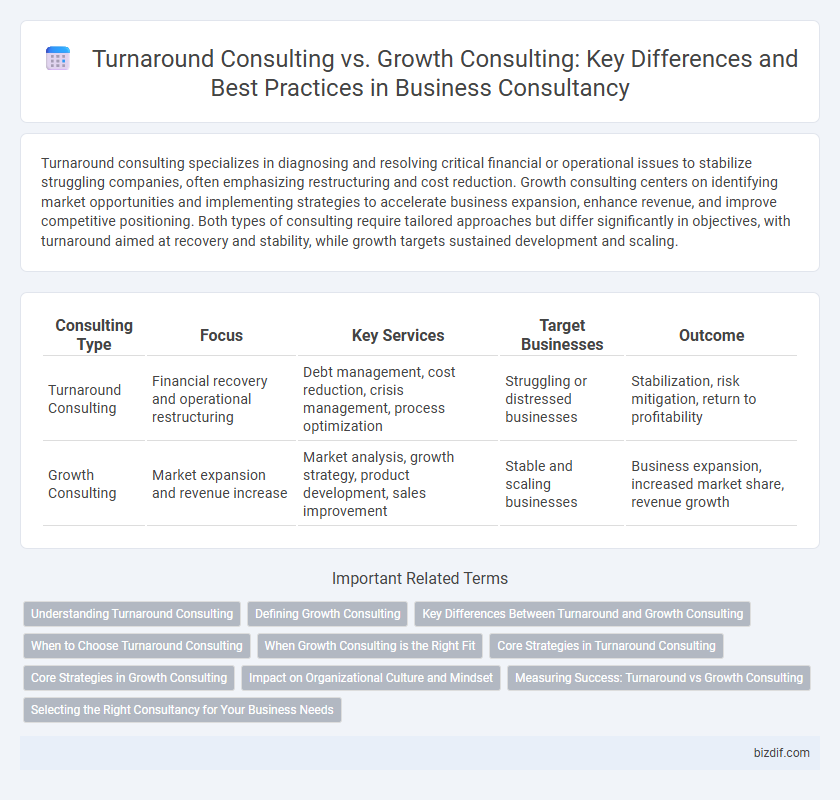Turnaround consulting specializes in diagnosing and resolving critical financial or operational issues to stabilize struggling companies, often emphasizing restructuring and cost reduction. Growth consulting centers on identifying market opportunities and implementing strategies to accelerate business expansion, enhance revenue, and improve competitive positioning. Both types of consulting require tailored approaches but differ significantly in objectives, with turnaround aimed at recovery and stability, while growth targets sustained development and scaling.
Table of Comparison
| Consulting Type | Focus | Key Services | Target Businesses | Outcome |
|---|---|---|---|---|
| Turnaround Consulting | Financial recovery and operational restructuring | Debt management, cost reduction, crisis management, process optimization | Struggling or distressed businesses | Stabilization, risk mitigation, return to profitability |
| Growth Consulting | Market expansion and revenue increase | Market analysis, growth strategy, product development, sales improvement | Stable and scaling businesses | Business expansion, increased market share, revenue growth |
Understanding Turnaround Consulting
Turnaround consulting specializes in diagnosing and resolving critical business challenges to restore financial stability and operational efficiency. By analyzing cash flow, restructuring debts, and optimizing management strategies, turnaround consultants aim to prevent bankruptcy and ensure short-term survival. This approach contrasts with growth consulting, which focuses on scaling operations and expanding market presence.
Defining Growth Consulting
Growth consulting focuses on identifying and leveraging new market opportunities and optimizing business strategies to increase revenue, customer base, and market share. This approach emphasizes sustainable expansion through innovation, product development, and customer engagement rather than merely stabilizing existing operations. Growth consultants analyze competitive landscapes and implement scalable solutions that drive long-term organizational transformation and profitability.
Key Differences Between Turnaround and Growth Consulting
Turnaround consulting focuses on rescuing struggling businesses by identifying and resolving critical issues such as financial distress, operational inefficiencies, and market decline. Growth consulting emphasizes strategies for scaling, market expansion, and revenue enhancement through innovation, customer acquisition, and competitive positioning. Key differences lie in their objectives: turnaround consulting seeks stabilization and survival, while growth consulting targets long-term development and profitability.
When to Choose Turnaround Consulting
Turnaround consulting is essential when a company faces severe financial distress, declining market share, or operational inefficiencies threatening its survival. This specialized consultancy focuses on crisis management, restructuring debt, and implementing rapid operational improvements to stabilize the business. Businesses should choose turnaround consulting before insolvency risks escalate or when traditional growth strategies fail to reverse negative trends.
When Growth Consulting is the Right Fit
Growth consulting is the right fit when a business aims to expand market share, launch new products, or enter new markets, emphasizing long-term strategic development rather than crisis management. Companies experiencing steady performance but seeking innovation, operational scaling, or improved customer acquisition benefit most from growth consulting services. Growth consultants leverage data-driven strategies and market insights to optimize revenue streams and enhance competitive positioning for sustainable business expansion.
Core Strategies in Turnaround Consulting
Turnaround consulting centers on core strategies such as financial restructuring, operational improvement, and crisis management to restore a company's stability and profitability. Consultants prioritize cash flow optimization, cost reduction, and stakeholder communication to address immediate threats to business viability. These core strategies differ from growth consulting, which emphasizes market expansion and revenue acceleration instead of recovery.
Core Strategies in Growth Consulting
Growth consulting centers on core strategies such as market expansion, product innovation, and customer acquisition to drive sustainable revenue increases. Consultants analyze competitive landscapes, optimize go-to-market approaches, and implement scalable business models tailored for long-term growth. These core strategies differentiate growth consulting from turnaround consulting, which primarily focuses on crisis management and operational restructuring.
Impact on Organizational Culture and Mindset
Turnaround consulting focuses on reshaping organizational culture by addressing crises, instilling urgency, and fostering resilience to survive and stabilize the business. Growth consulting promotes a progressive mindset, emphasizing innovation, collaboration, and long-term value creation to drive sustainable expansion. Both approaches impact culture differently: turnaround consulting often requires rapid culture shifts to overcome challenges, while growth consulting cultivates continuous improvement and adaptive thinking.
Measuring Success: Turnaround vs Growth Consulting
Turnaround consulting measures success by rapid financial recovery, debt reduction, and operational restructuring, focusing on stabilizing struggling businesses. Growth consulting evaluates success through revenue increase, market expansion, and sustainable innovation, aiming to accelerate long-term business development. Key performance indicators (KPIs) differ, with turnaround consulting emphasizing cash flow improvement and cost-cutting, while growth consulting prioritizes customer acquisition and product diversification.
Selecting the Right Consultancy for Your Business Needs
Turnaround consulting focuses on diagnosing and resolving critical financial or operational crises to restore company stability, while growth consulting aims to identify new market opportunities and drive sustainable revenue expansion. Selecting the right consultancy depends on assessing your business's current challenges--whether immediate recovery or long-term scalability is the priority--alongside expertise in your specific industry and proven methodologies. Evaluating consultants' track records, strategic approach, and alignment with your organizational goals ensures tailored solutions that optimize business performance and growth potential.
Turnaround Consulting vs Growth Consulting Infographic

 bizdif.com
bizdif.com